Indians were also asked to evaluate the influence of six other countries. Of the countries asked about, the U.S. is most likely to be seen as having become more influential, with about half of Indians saying they see the United States’ influence in the world in recent years getting stronger. In contrast, 14% say that the United States’ influence in the world is getting weaker, while about three-in-ten say it is staying about the same.
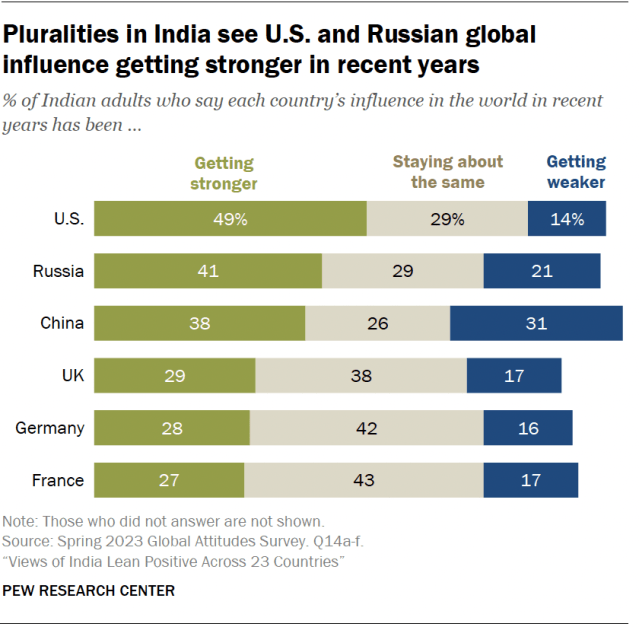
Indians are also positive on views of the U.S. at large, with 65% saying they have a favorable view of the U.S. and 64% expressing confidence in U.S. President Joe Biden to do the right thing regarding world affairs.
Those who believe that the U.S. is the world’s leading economic power are more likely to believe that American influence is getting stronger, as are those who say the U.S. contributes to peace and stability and that the U.S. interferes in the affairs of other countries.
Many Indians also believe that Russia’s global influence has strengthened, with about four-in-ten saying that Russia’s influence in the world has been getting stronger in recent years. Roughly three-in-ten say that it has been staying about the same, while about two-in-ten say that Russia’s influence has been getting weaker. Indians stand out on overall favorability of Russia as the only place among the 24 countries surveyed this year where majorities say they have a favorable opinion of Russia and have confidence in Russian President Vladimir Putin.
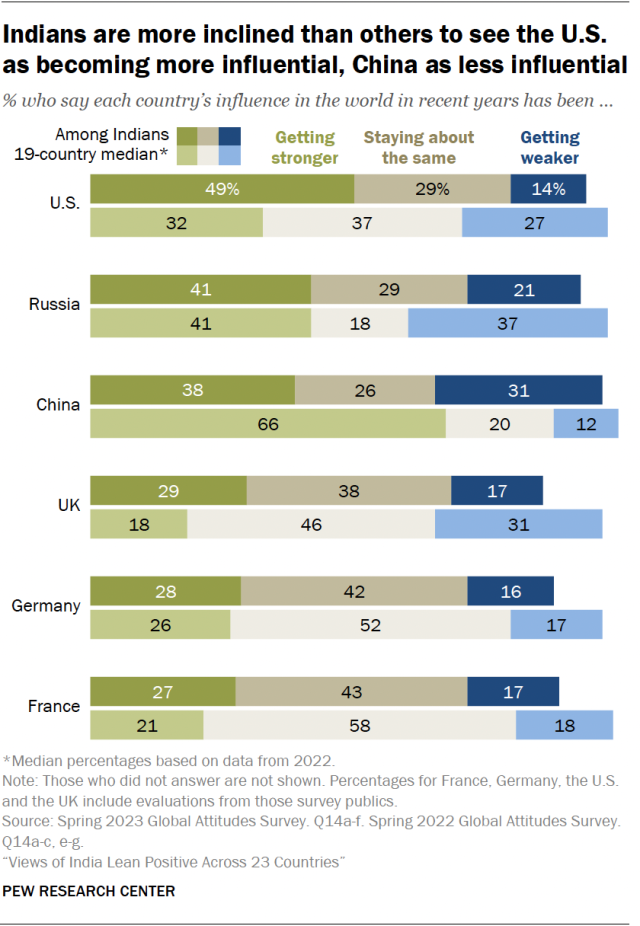
Indians’ views on China’s influence in the world are somewhat more mixed, with about four-in-ten also saying that China’s influence has been getting stronger. In contrast, around three-in-ten Indians say that China’s influence has been getting weaker, more than say the same of any other country asked about. In India, negative views of China have also reached historic highs since the country was last surveyed in 2019. Two-thirds of Indians express an unfavorable opinion of China, making India the only middle-income country where a majority has unfavorable views of China.
The global influence of the UK, Germany and France are seen similarly in India, with roughly four-in-ten Indians saying each country’s influence in the world has been staying about the same in recent years. About three-in-ten say that the global influence of each country has been growing, while fewer than two-in-ten say that it has been getting weaker in recent years.
These six countries are viewed slightly differently in India than in 19 high-income countries where the question was asked in 2022. A 19-country median of 32% said U.S. influence is getting stronger, compared with the roughly half of Indians who say the same. In only one country – Poland – did more than half say that American influence is growing. Indians’ views on China’s influence also differ from other countries, with fewer Indians saying that China’s influence in the world is getting stronger than adults saying the same among countries surveyed last year. In 2022, a median of 66% among 19 countries said that China’s influence is getting stronger, with half or more in every country surveyed saying this.
Meanwhile, a somewhat larger share of Indians say that the UK’s and France’s global influence has been getting stronger than do shares among many countries where the question was asked in 2022. The findings in India regarding Russia and Germany’s influence are more similar to those of countries surveyed in 2022. A median of 41% among 19 countries said that Russia’s influence is getting stronger, while a median of 26% said the same of German influence in the world.
Indians’ views of Russia, the U.S. and China
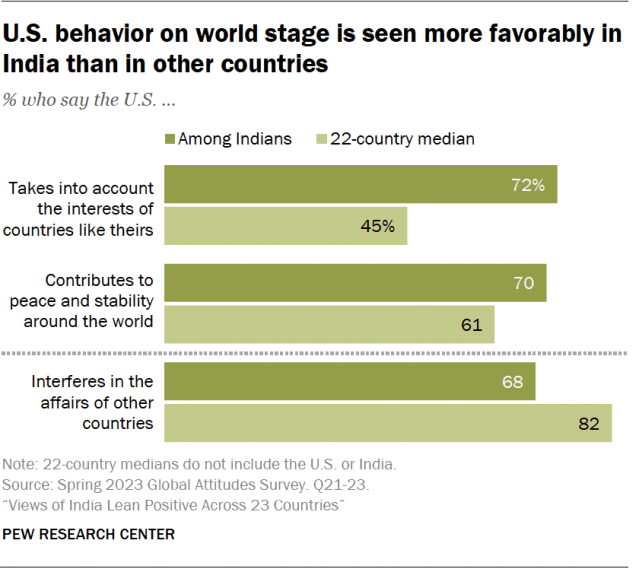
In addition to its relatively high assessment of U.S. influence in world affairs, the Indian public also gives the U.S. more positive overall ratings than adults in most other countries surveyed this year. Roughly two-thirds of Indian adults hold a favorable view of the U.S., including 23% with a very favorable view. Indians also give the United States’ international behavior positive ratings. About three-quarters say U.S. foreign policy takes their country’s interests into account, and seven-in-ten say the U.S. contributes to world peace.
Still, not all aspects of the U.S. are seen positively in India. Roughly two-thirds of adults in India say the U.S. interferes in the affairs of other countries, and Indians are the most likely to say American movies, television and music are below average or the worst (20%). For more on international views of the U.S., read “International Views of Biden and U.S. Largely Positive.”
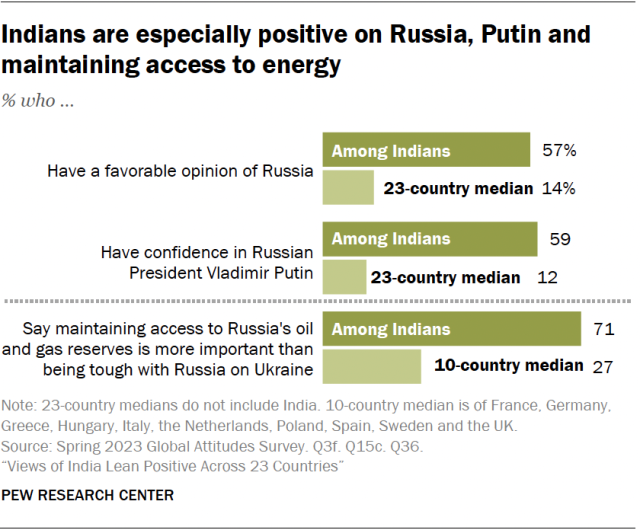
Russia is likewise seen favorably in India. In fact, India is the only country surveyed where a majority has a favorable view of the country – including 23% of Indians who see Russia very favorably – and is one of two countries where ratings for Russia have become more favorable in recent years. Of the 11 countries where Russian energy was a particularly salient issue, India was also one of three countries where a majority prioritized maintaining access to Russian oil and gas over being tough with Russia on Ukraine. Indian imports of Russian oil recently reached new highs, and India has repeatedly abstained from voting on Russia’s invasion of Ukraine.
Positive views of Putin accompany favorable views of Russia among Indians. India is the only country in which a majority says they have confidence in Putin to do the right thing regarding world affairs. This includes 19% with a lot of confidence. In comparison, a 23-country median of 70% say they have no confidence at all in Putin. Again, India is one of two countries where confidence in Putin has grown recently.
Views of Russia and its leader are partisan issues in India. Those with a favorable view of the right-wing BJP are more likely than those who do not support the party to have positive views of Russia or confidence in Putin. More on international views of Russia can be read in “Large Shares See Russia and Putin in Negative Light, While Views of Zelenskyy More Mixed.”
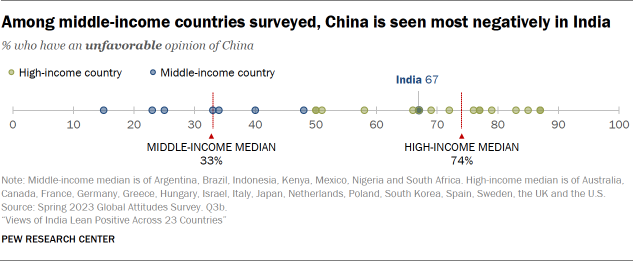
While Indians stand out for their positive evaluations of the U.S. and Russia, they are notably more critical of China. India is the only middle-income country surveyed where a majority has an unfavorable view of China (67%); it also has the largest share with a very unfavorable view of China among all the countries surveyed (50%). Critical views of China have become more common in India since 2019, and continued border tensions between the two countries may have contributed to the 21 percentage point increase.
A majority of Indians also have no confidence in Chinese President Xi Jinping, with 48% having no confidence at all. This is likewise the highest share to have a negative opinion recorded in India. (Indians have also become more likely to provide an opinion on Xi over time.)
Increasingly negative views of China and its leader are accompanied by increased skepticism that China takes Indian interests into account when making foreign policy decisions. While only 28% of Indians said that China did not take their country’s interests into account in 2013, 58% now say so in 2023. This is the largest increase observed among countries surveyed. Similarly, Indians are the most likely to say China does nothing at all to help with global peace and stability (49%).
Chinese investment is also viewed with skepticism in India. When asked alongside those in other middle-income countries to evaluate the impacts of Chinese investment, more than half say Chinese investment has not been good for the Indian economy. Four-in-ten say Chinese investment has provided no benefits at all, again the largest share recorded. For more on international views of China, read “China’s Approach to Foreign Policy Gets Largely Negative Reviews in 24-Country Survey.”
Indians’ views of Pakistan
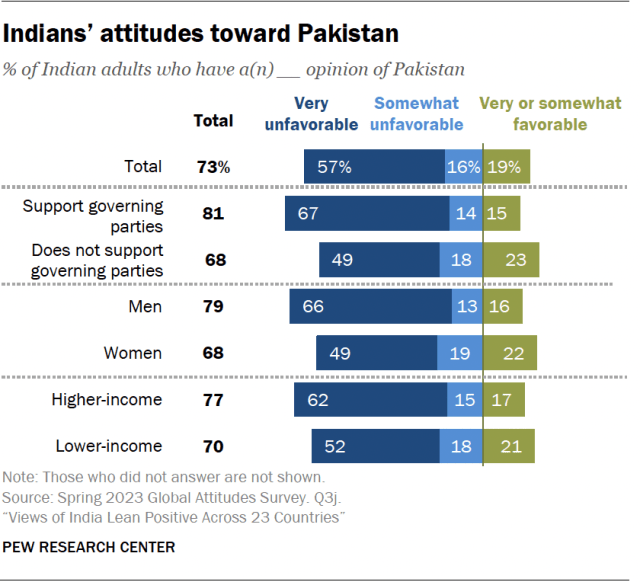
Strained bilateral relations between India and Pakistan date back to the 1947 Partition of British India into independent India and Pakistan and more recently center on disputed control of Jammu and Kashmir.
About seven-in-ten Indians have an unfavorable view of Pakistan, including 57% who are very unfavorable toward Pakistan. Just 19% in India have a favorable view of the neighboring country.
Men are more likely than women to have an unfavorable view of Pakistan. They are especially likely to say they are very unfavorable: 66% of Indian men hold this opinion, while 49% of Indian women say the same. Women were somewhat less likely than men to state their opinion either way.
Those who support the governing parties in the National Democratic Alliance (which includes Modi’s party, the BJP) are more likely to express an unfavorable view of Pakistan than those who do not support the governing parties. And two-thirds of those who support the governing parties are very unfavorable toward Pakistan, compared with about half of those who do not support these parties. For more information on how we classify governing parties, read Appendix A.
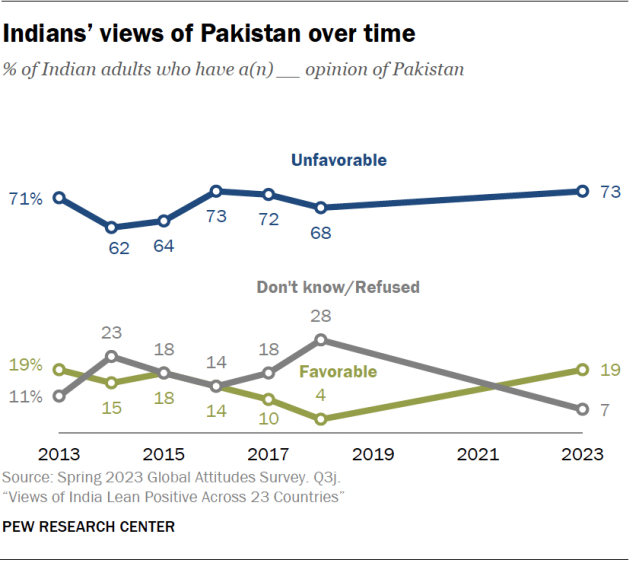
Opinion of Pakistan among the Indian public has been far more negative than positive since this question was first asked in 2013. Over the last 10 years, unfavorable views of India’s neighbor never dropped below 62%. This year, the share who have an unfavorable view of Pakistan has increased 5 percentage points since 2018, when the question was last asked. The share with a favorable view also increased (15 points), but this is likely due to a decline among those who did not respond between 2018 and 2023.


